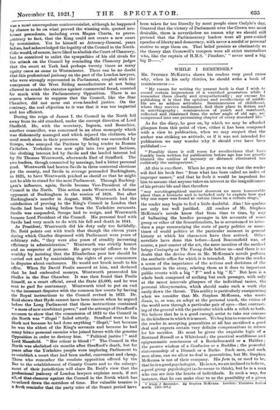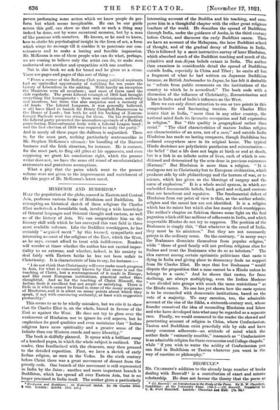WHILE I REMEMBER.*
MM. STEPHEN McKee-NA shows his readers very good cause why, when in his early thirties, he should write a book of reminiscences :— " My reason for writing the present book is that I wish to record certain impressions of a vanished generation while I remember them clearly and sympathetically ; my excuse for publishing it is that the opinions and recollections of middle life are so seldom articulate. Reminiscences of childhood, where they survive undimmed, find their place in fiction and in autobiography ; reminiscences of youth and manhood, collected and chastened from the sober anglo of old ago, are compressed into one patronizing chapter of every standard life."
As for the diary, he goes on, by which we may be afforded glimpses from this point of view, either it has been composed with a view to publication, when wo may suspect that the author was striking an attitude, or if it was not intended for publication we may wonder why it should ever have been published :-
" Possibly there is still room for recollections that have frankly been written for publication before ago has too greatly blurred the outline of memory or distance eliminated too ruthlessly the unimportant."
All this is excellent. When ho goes on to say that the reader will find his book free " from what has been called an index of improper names," and that he feels it would be impudent for him to assume that anyone takes an interest in the insignificances of his private life and that therefore
" any autobiographical matter deserves no more honourable place than a footnote and is included only to explain how and why one super was found at certain times on a certain stage,"
the reader may begin to feel a little doubtful. Alas ! his qualms are only too well justified. All readers of Mr. Stephen McKenna's novels know that from time to time, by way of ballasting the headier passages in his accounts of some group or other of the Sensationalists. he is accustomed to intro- duce a page summarizing the state of party politics or some- times of world politics at the particular moment in general history at which his characters have then arrived. Other novelists have done this before—Lord Beaconsfield was, of course, a past-master of the art, the mere mention of the method brings Coningeby or The Young Duke before us—and there is no doubt that the device does in Mr. McKenna's novels perform the aesthetic office for which it is intended. It gives the reader a sense of the importance of the actions and decisions of the characters in the story, relating them as it does to important public events with a big " P " and a big " E." But hero is a whole book composed of nothing but such passages, with only at the rarest intervals glimpses of the individual tastes, the personal idiosyncrasies, which should make such a work slip easily down the throat. This aridity is particularly exasperating when we consider that Mr. Stephen McKenna, who wrote Sonia, is, or was, an adept at the personal touch, the vision of the world seen through a particular pair of eyes—that contrast. ing of the general with the particular which adds a relish to both. We believe that he is a good enough artist to take our censure in the kindness in which it is meant. We beg him to remember that the reader in accepting generalities at all has sacrificed a good deal and expects certain very definite compensations in return for his sacrifice. He must be given the exquisite login of a Bertrand Russell or a Whitehead ; the practical worldliness and epigrammatic conciseness of a Rochefoucauld or a Halifax ; the passive wisdom of a Confucius or a Buddha ; the powerful statesmanship of a Disraeli or a Burke. Such mon, and such men alone, can we allow to deal in generalities, but Mr. Stephen McKenna is not of their company. His forte is, or used to be, that he is a good psychologist. He is not, we are inclined to believe, a good group psychologist (as ho seems to think), but he is a man who can see into the hearts of individuals. In such a way, for instance, that ho can make clear to us the possibility of a given • While I Remember. By Stephen McKenna. London: Thornton Butter'
worth. net.] person performing some action which we know people do per- form but which seems inexplicable. He can be our guide across this gulf, can show us that such or such a thing may indeed be done, not by some unnatural monster, but by a man of like passions with ourselves. He knows, or he used to know, how to clothe his psychological insight in the form of art, a form which wings its message till it enables it to penetrato our con- sciousness and to make a lasting and forcible impression. Mr. McKenna is one of those people who can do what, perhaps, we are coming to believe only tho artist can do, to make men understand one another and sympathize with one another.
But in this book we ask for bread and he gives us a stone. There are pages and pages of this sort of thing :-
"From a corner of the Reform Club young political aspirants had an -unrivalled opportunity of watching for ten years the history of Liberalism in the making. With 'hardly an exception the Ministers were all members ; and most of them used the club regularly. The great Liberal triumph of 1906 had brought everything but homogeneity : there was enthusiasm, authority and numbers, but there was also suspicion and a memory of old feuds. Tho Liberal Leaguers, it was generally believed, w ukl have liked to banish Sir Henry Campbell-Bannerman to the House of Lords ; but both he and his backing of Noncon- formist Radicals wore too strong for them. On his resignation the Liberal party presented the anomalous spectacle of a Radical, poaco-loving, Nonconformist body with a Liberal League head ; and the first election of 1910 was required to unify the party."
And in nearly all these pages the dullness is unjustified. There is, for the most part, nothing particularly statesmanlike in Mr. Stephen Meliennit's resumes: his handling of the Marconi business and the Irish situation, for instance. Ho is content, for the most part, to fling old gibes at his opponents, and even supposing we grant his conclusions right, which the present writer does not, we have the same old round of unsubstantiated statements and gratuitous assumptions.
What a pity that the pains which went to the present volume wcro not given to the improvement and enrichment of the thin pages of Mr. McKenna's latest novel.







































 Previous page
Previous page